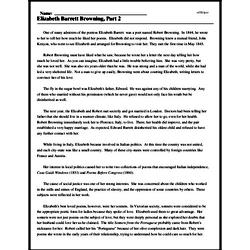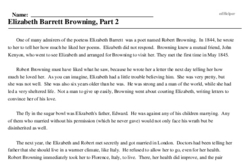Elizabeth Barrett Browning, Part 2
Elizabeth Barrett Browning
Reading Comprehension for March 6
One of many admirers of the poetess Elizabeth Barrett was a poet named Robert Browning. In 1844, he wrote to her to tell her how much he liked her poems. Elizabeth did not respond. Browning knew a mutual friend, John Kenyon, who went to see Elizabeth and arranged for Browning to visit her. They met the first time in May 1845.
Robert Browning must have liked what he saw, because he wrote her a letter the next day telling her how much he loved her. As you can imagine, Elizabeth had a little trouble believing him. She was very pretty, but she was not well. She was also six years older than he was. He was strong and a man of the world, while she had led a very sheltered life. Not a man to give up easily, Browning went about courting Elizabeth, writing letters to convince her of his love.
The fly in the sugar bowl was Elizabeth's father, Edward. He was against any of his children marrying. Any of them who married without his permission (which he never gave) would not only face his wrath but be disinherited as well.
The next year, the Elizabeth and Robert met secretly and got married in London. Doctors had been telling her father that she should live in a warmer climate, like Italy. He refused to allow her to go, even for her health. Robert Browning immediately took her to Florence, Italy, to live. There, her health did improve, and the pair established a very happy marriage. As expected, Edward Barrett disinherited his oldest child and refused to have any further contact with her.



